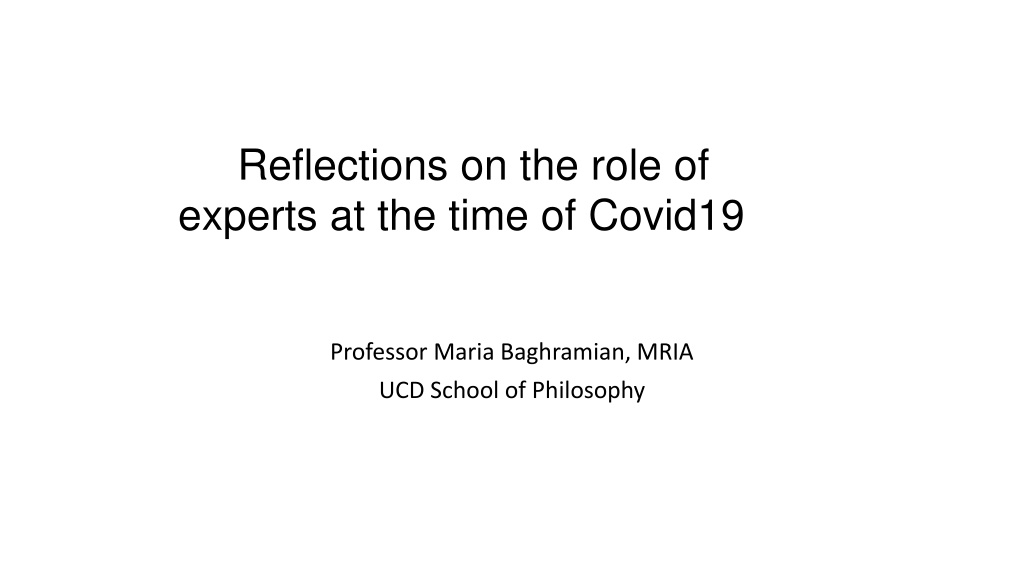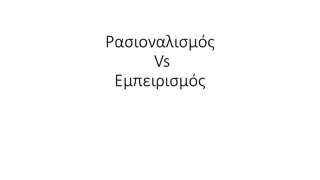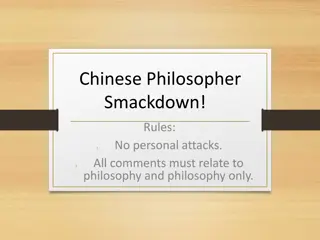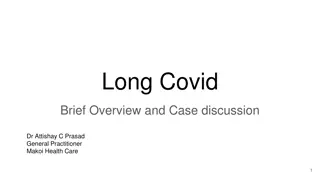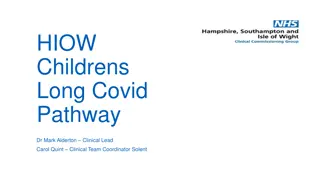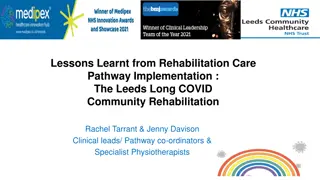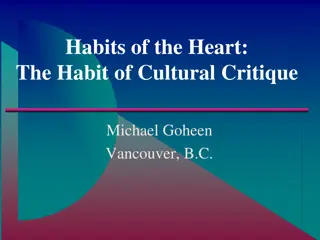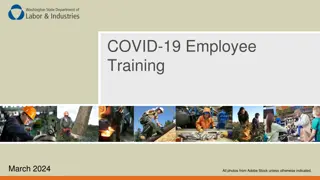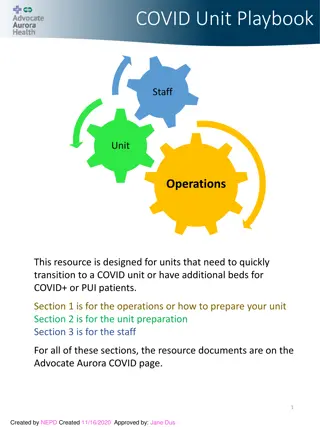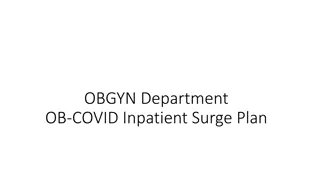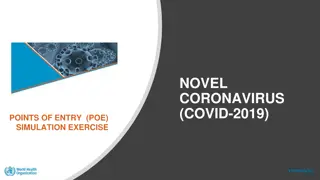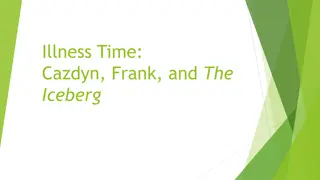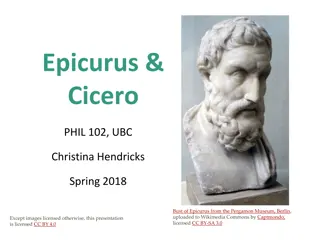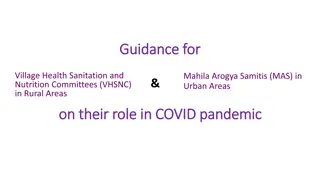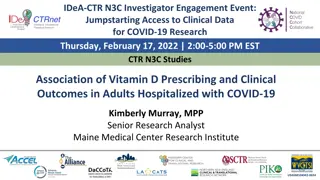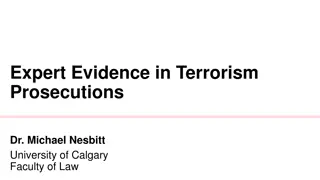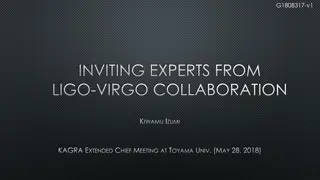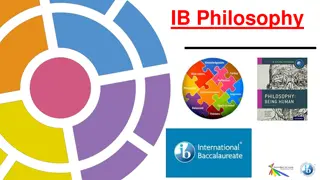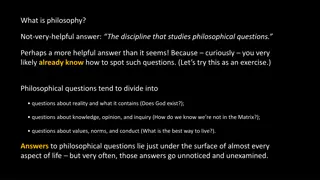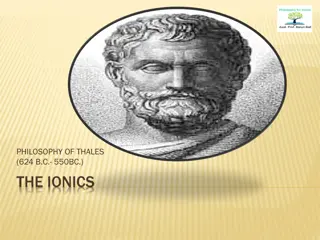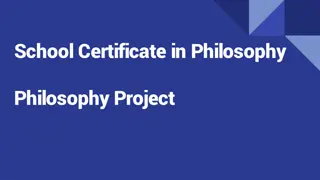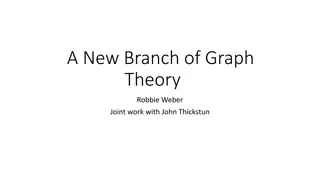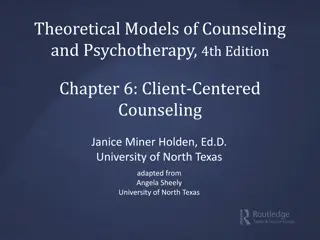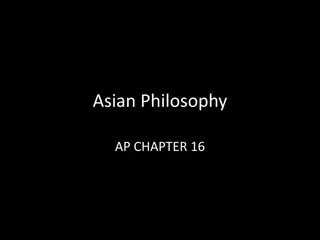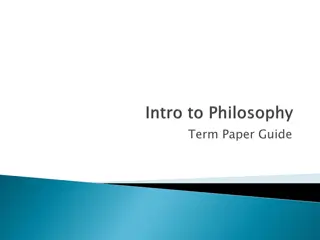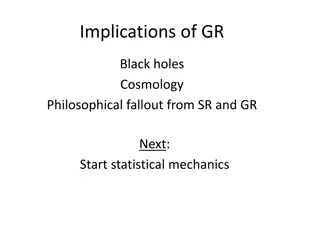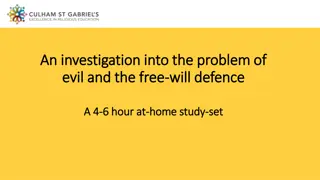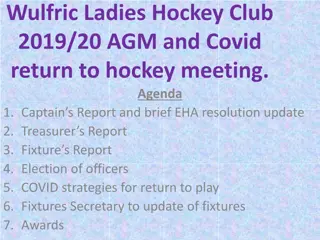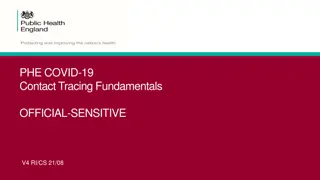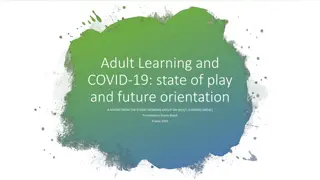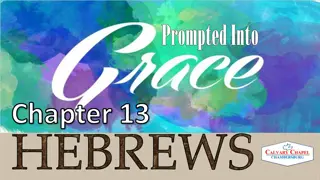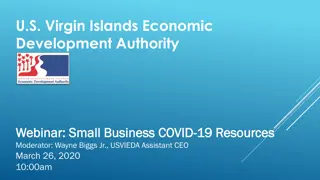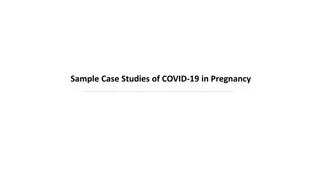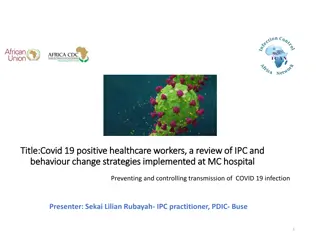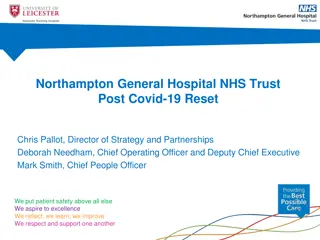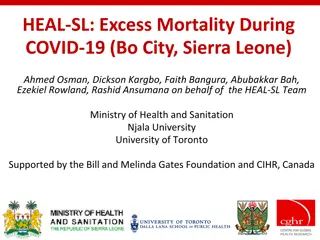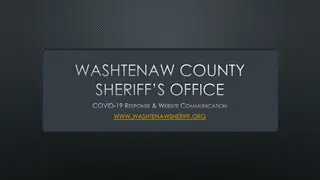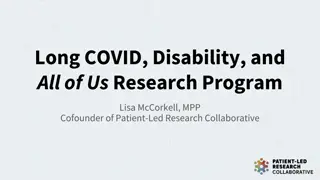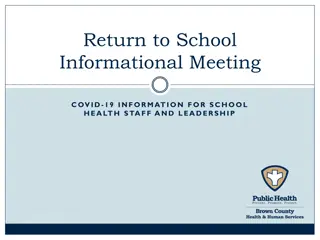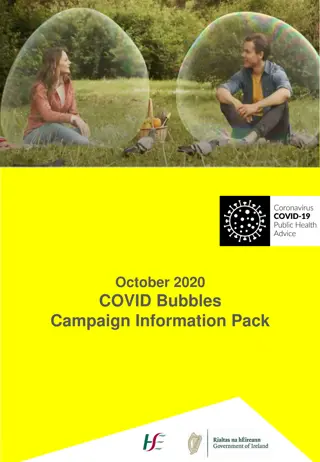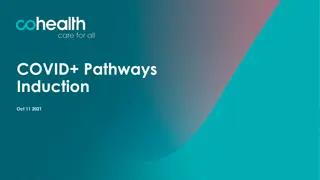Role of Experts in the Time of Covid-19: Philosophical Reflections
Professor Maria Baghramian discusses the evolving role of experts during Covid-19, emphasizing conceptual analysis and normative considerations. She highlights the formal reliance on expert advice in modern governance and identifies key goals for expert advice in addressing challenges like Covid-19. The pandemic has led to a radical change in the visibility and reliance on experts, presenting enormous challenges in providing evidence-based advice and establishing trustworthiness.
Download Presentation

Please find below an Image/Link to download the presentation.
The content on the website is provided AS IS for your information and personal use only. It may not be sold, licensed, or shared on other websites without obtaining consent from the author. Download presentation by click this link. If you encounter any issues during the download, it is possible that the publisher has removed the file from their server.
E N D
Presentation Transcript
Reflections on the role of experts at the time of Covid19 Professor Maria Baghramian, MRIA UCD School of Philosophy
A philosophical, rather than empirical, approach Two key elements of the approach 1. Conceptual analysis: Trying to critically unpack key concepts such as expertise, evidence, trust. Why? Because human action is inseparable form human thought and our thinking is made possible through conceptualization 2. Normative Considerations: examining the space of reasons both for expert advice and policy decisions, i. e. the ways in which considerations of right and wrong, harm and benefit dictate our reasoning. Why? The key question facing us is what are the best ways for dealing with this crisis.
Background Formal reliance on expert advice has become a feature of modern governance. Most advanced democratic governments, at least since the 1990s, have put in place formal mechanisms for seeking expert advice and consulting with them. These vary in different jurisdictions, but their general features are similar.
Key goals of expert advice Enlightenment: Informing about the state-of-the-art of issues Orientation: provide an understanding of a challenge Strategic planning: providing strategies for reaching predefined objectives Problem solving: formulating solutions to a given problem or challenge Integration: bringing together various forms of knowledge with the hope of co-creation of knowledge. All these goals apply to the case of experts dealing with Covid19
BUT: A radical change of context Covid19 has substantially changed the role of (medical) experts Vocal reliance on experts by politicians. Referencing them on policy issues. Public visibility, turning them into public figures. Chief medical advisors and chairs of advisory committees have become household names, routinely addressing us during public briefings. The urgency and gravity of their task.
Enormous challenges The challenges of making informed decisions in the face of extreme urgency and uncertainty. I will briefly discuss 2 challenges and their normative consequences I. Providing (rigorous) evidence-based advice II. Establishing trustworthiness
I. On Evidence There is a widely accepted hierarchy of evidence for medical policy I. conducted randomised controlled trial together with well conducted systematic review or meta-analysis of the results II-1: Well-designed controlled trial without randomization II-2: Well-designed cohort or case-control analytic study II-3: Multiple time series with or without the intervention; dramatic results from uncontrolled experiments III: Opinions of respected authorities, based on clinical experience; descriptive studies or case reports; reports of expert committees (US Preventive Service Task Force 2008: section 4).
I-III do not fully apply to the current pandemic Randomized controlled trials and a systematic review of their results, known as the gold standard of evidence gathering, were not possible at the height of the pandemic. Even when possible, it will take time to check and compare the results. Even weaker criteria for reliable evidence gathering do not always apply. E.G. Difficult to get controlled evidence on difference levels of quarantine and self-isolation.
Alternative methodology: Constructing models and making projections Scientific models are indirect modes of exploring the world. Models artificially construct and interrogate a segment of the world using available data and a number of assumptions about them. Models are as good as the data that goes into them. In the fast-changing information landscape of Coronavirus data are inevitably incomplete and partial. Also models, reflect a localised segment of information as well as the researchers theoretical biases. So, they may not be applicable to other locations, countries etc. So, the models are going to be inherently uncertain and error prone. HOWEVER, they are currently the best tools that experts advising governments have at their disposal. How to deal with the uncertainties? A Triangulation of Response
On the Experts Side: Addressing Inductive Risks Using models involve probability estimates (e.g. the effect of policies on health service, number of lives saved, impact on economy, etc. ) Reliance on probability estimates introduces, what philosophers of science call, inductive risks, i.e. the risks scientists incur if their probability estimates turn out to be wrong. Appropriate value judgements are ways of mitigating the risk (Douglas 2009) Rule of thumb the greater the risk of making an error, the less risk you should take regarding the welfare of those affected by the scientific advice What is the nature of the risk? Whose welfare is at stake? Who is to answer these questions? Open dialogues between the experts, the policy makers and the general public. e.g. online townhalls, is the way to answer these questions. Scientific experts do not have moral expertise Such decisions must be a matter of collective judgement and public discussion.
On the publics side: Embracing Fallibility We, the public, need to accept the fallibilistic approach of the sciences. The acceptance of fallibility and a willingness to self-correct are some of the most admirable features of the methodologies of science. But their injection into the science/policy nexus has never been welcome. Policy makers, as well as the general public, often look for certainty But absolute certainties are not the business of science and should not be. Science can can only offer the best explanations/projections , based on available information and methodology, at any given time. But best here is a relative term. (Not a very reassuring message!! But what is these days?)
The side of politics: Addressing a risk facing the experts Politicians relying on scientific advice may blame the experts for policy failures.(We can already see this in Britain, but there is no reason to think that something similar will not happen in other countries, including in Ireland). Vigilance, but the media and the general public, about transference of blame, is quite important, otherwise experts may become over-cautious. Important to remember: Scientists give advice on policy, but they do not make or implement policy. But the politicians are also facing complex unprecedented choices. So maybe it s time for politicians to become more like scientists, admitting deep fallibility and showing a willingness to continuously self-correct. The courage to take this step, in turn, will require forbearance and forgiveness from the public.
II. Trustworthiness It has been widely and rightly argued that trust in expert advice is necessary for the effective implementation of public policy. Markers of trustworthy experts: Competence: They know what they are doing and hold great many true beliefs in the area relevant to their expertise. (Goldman, 2001) Credibility: They provide true/correct information and employ rigorous methods (Wilholt 2013, Cartwright 2015) Integrity and honesty: They will not knowingly mislead their interlocutors (O Neill, 2002). Track record: They have a positive record showing their competence and credibility (Origgi 2018). Benevolence: They are, by and large, disposed to act in the interest of relevant others ( Baier 1991 ). In other words, they have and show good will. 1991.
How applicable are these markers to Covid19? Competence: No one has full competence in dealing with Novel Coronavirus. At best a track record of and competence in dealing with other pandemics. Credibility: What counts as credible evidence is yet to be fully established. A period of flux. Judgements of the integrity and honesty will largely depend on past performances, but also on the way the experts address the public. Admissions of fallibility, for instance, could be a criterion of honesty but there is feat that it might have an adverse impact on public s judgements of the experts competence Benevolence: Towards whom? The vulnerable population and their families, the population at large? Those who are particularly vulnerable to the economic consequences of social isolation, victims of domestic abuse and other crimes?
Facing the challenge of being trustworthy 1. Transparency and openness to scrutiny by other experts will minimise the risk of error and improve credibility. 2. Making the normative assumptions and value judgements explicit. (This can become a marker of integrity). 3.Involving more voices in the discussions about the choices and the value judgements will increase levels of trust. 4. Respecting the public, e.g. not to resort to paternalism, is always a marker of good will.
But, not just a question of trust Talk of trust in experts may hide a more fundamental difficulty. It s not so much that people, during this crisis, mistrust medical experts or are resistant to evidence offered to them. Rather, they tend to believe in and give equal credence to unreliable evidence and advice.
Two forms of openness to unreliable evidence 1. A less pernicious form: Time lag In a fast-moving knowledge landscape, information and directives about Covid19 change quite rapidly. Based on information gleaned from social media posts, the population, as a whole, seems slow in catching up with these changes and continue reposting and retweeting obsolete information, with possible adverse consequences.
2. More serious: Openness to misinformation and unproven claims The source usually is friends or family on social media. Occasionally also eminent figures with expertise in other areas (e.g. Nobel Prize-winning scientist Luc Montagnier and his recent claim that Covid19 was developed in a lab). Key argument for freedom of speech (e.g. John Stuart Mill. 1859 On Liberty): once diverse ideas are permitted to compete freely then the true ones will win. The age of internet and social media has put a lie to this idea. It turns out that it is very difficult to eradicate false beliefs when their resurgence is only one click or one like away.
Rivals in trustworthiness? Family and friends are often trusted sources of information and advice in our daily lives. Our lives will be much the poorer without our trusted networks. The emotional load of these networks of trust should not be neglected. Their members have inherent, often unexamined, credibility. At the other end of the spectrum, titles and prizes also have an immediate impact on judgements of trustworthiness. They too are part of our assessment of credibility and hence trustworthiness. Solution? Big debate, in short: Policy makers cannot suppress these extended circles of trusted sources but should be mindful of the affective dimensions of who and why we trust and take these factors into account.
Acknowledgement This work has received funding from the European Union s Horizon 2020 research and innovation programme under grant agreement No 870883. The information and opinions in this presentation and other communications materials are those of the author and do not necessarily reflect the opinion of the European Commission. Comments and Questions to maria.baghramian@ucd.ie PEriTiA: Policy, Expertise and Trust in Action https://peritia-trust.eu
Some References Alcoff, Linda Martin. (2001) On Judging Epistemic Credibility: Is Social Identity Relevant? In Nancy Tuana and Sandra Morgen (Eds.), Engendering Rationalities, pp.53-80. Albany: SUNY Press Ambrus, M., Arts, K., Hey, E., & Raulus, H. (2014). The Role of Experts in International and European Decision-Making Processes: Advisors, Decision-Makers or Irrelevant Actors? Cambridge: Cambridge University Press Baghramian, M and Martini, C. 2018 and 2019. (eds.) Expertise and Expert Knowledge; Social Epistemology A Journal of Knowledge, Culture and Policy, (Special Issue) Volume 32, 2018 - Issue 6 and Volume 33, Baghramian, M. (ed.) 2019) From Trust to Trustworthiness, London/New York: Taylor and Francis Baier, Annette C. (1991). Trust and Its Vulnerabilities & Sustaining Trust. Tanner Lectures, xiii, 1-68. Briguglio, M. & Spiteri, J. (2018). Does Good Governance Foster Trust in Government? An Empirical Analysis. In Grima, S. & Marano, P. (Eds.). Governance and Regulations: Contemporary Issues. Bingley: Emerald Publishing Limited. Christensen, J., & Holst, C. (2017). Advisory commissions, academic expertise and democratic legitimacy: the case of Norway. Science and Public Policy, 44(6), 821 833. Christensen, J., Gornitzka, A., & Holst, C. (2016). The Knowledge Regimes in the Nordic Countries. In Knutsen, O. (Ed.) The Nordic Models in Political Science (pp.239-254). Bergen: Fagbokforlaget.
Coady, D. & Chase, J. (Eds). (2018). The Routledge Handbook of Applied Epistemology. London: Routledge. Douglas, H. E. (2009). Science, policy, and the value-free ideal. Pittsburgh, PA: Pittsburgh, PA : University of Pittsburgh Press. Edelman. (2019). Edelman trust barometer 2019. Annual global study. NY: Edelman.com. Retrieved from www.edelman.com/2019- edelman-trust-barometer/ Fehr, B. & Harasymchuk, C. (2005). The experience of emotion in close relationships: Towards an integration of the emotion-in- relationships and interpersonal script models. Personal Relationships, 12(2), 181-196. Fischer, F. (2009). Democracy and Expertise: Reorienting Policy Inquiry. Oxford: OUP. Goldberg, Sandy (2011). The Division of Epistemic Labor. Episteme 8 (1):112-125. Hendriks, F, Dorothe Kienhues, D. and Bromme, R (2016) Trust in Science and the Science of Trust, in B. Blobaum (ed.), Trust and Communication in a Digitized World, Springer International Publishing. Jasanoff, S. S. (2003). Technologies of Humility: Citizen Participation in Governing Science. Minerva, 41(3), 223-244. Jones, Karen. (1996). Trust as an Affective Attitude. Ethics, 107(1), 4-25. Longino, H. (1996). Cognitive and Non-Cognitive Values in Science: Rethinking the Dichotomy. In Nelson, L. H. & Nelson, J., (Eds.) Feminism, Science, and the Philosophy of Science. NY: Springer. O'Neill, Onora. (2002a). A Question of Trust. Cambridge: Cambridge University Press Origgi, Gloria. (2018). Reputation: What it is and Why it Matters. NJ: Princeton University Press. Owens, S. (2015). Knowledge, Policy, and Expertise: The UK Royal Commission on Environmental Pollution 1970-2011. Oxford: OUP.
Pappas, Gregory Fernando. (2020) Philosophical Meditations on Covid 19 http://goyopappas.com/covid- 19.html?fbclid=IwAR3NZd5uZXk1xwZemyOv_f2LfkrbyY- eW_GWarcjqd4HKaCvZg7WYLg9xcg Schwella, Erwin. (2014). Knowledge based governance, governance as learning: the leadership implications, International Journal of Leadership in Public Services, Vol. 10(2), 84-90. Seligman, Adam B. The Problem of Trust. Princeton: Princeton University Press, 1997. Shapin, Steven. (1995). Trust, Honesty, and the Authority of Science. In Bulger, R. E., Bobby, E.M. & van Dijck, J. (2017). In data we trust? The implications of datafication for social monitoring. Matrizes, 11(1), 39-59. Whyte, Kyle Powys, and Robert P. Crease. (2010). Trust, Expertise, and the Philosophy of Science. Synthese, 177(3), 411-425. Wilholt, T. (2013). Epistemic Trust in Science. The British Journal for the Philosophy of Science, 64(2), 233-253. Williams, D. (2005) Good Governance and Political Governance , Political Studies Association Annual Conference.
